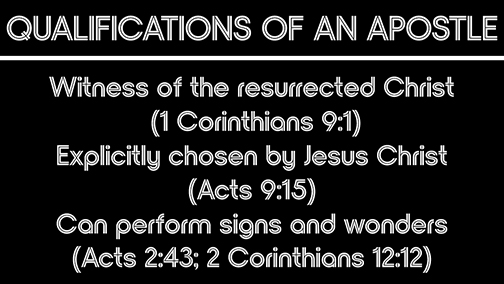YOU ARE NOT AN APOSTLE
If the wealth of a nation were to be determined by the abundance of apostles, Nigeria would be the wealthiest place on God’s earth. It’s a land crawling with apostles. Everywhere you go, an apostle is there waiting for you. Whichever direction you turn, there’s an apostle staring you in the face.
If you step out of your house and take a stroll down the street in any village in Nigeria, you are most likely to run into one or two apostles before you walk 1 kilometer.
For there to be so many apostles in one place, it’s not too farfetched to expect the society to be transformed by their holy presence. Having such an abundance of apostles, it’s logical to expect that the medical professionals will be out of jobs and all the hospitals closed down because sickness and diseases have been banished, and the people are living in divine health.
Because of the hosts of apostles in the land, crimes ought to have ceased and criminals become saints. By virtue of an overflowing apostolic anointing, the whole country ought to be a paradise – a heaven on earth. Nigeria ought to be a place of guaranteed health and wellbeing for the citizens on the account of the millions of apostles.
Instead, Nigeria is a hell on earth. It’s a haven of kidnappers, den of robbers, a sanctum of crooks, and a sanctuary for sickness and disease. There’s widespread chaos, and mayhem pervades everywhere. The anointing of Nigeria’s apostles have seemingly made zero impact on the character of the people. That the soul of the Nigerian nation is so rotten calls into question the legitimacy of its apostles. These people must be apostles of their own making.
Unlike Nigeria where apostles are as common as roasted plantain, the entire Bible has just thirteen Apostles. And the qualifications of an Apostle are clearly defined:
(1) eyewitness of the resurrected Christ (1 Corinthians 9:1)
(2) explicitly chosen by Jesus Christ Himself (Acts 9:15)
(3) can perform legitimate and authentic signs and wonders (Acts 2:43; 2 Corinthians 12:12).
Besides the twelve Disciples, and Matthias who replaced Judas Iscariot (Acts 1:22–26), the only other Apostle was Paul who was called by Jesus on the road to Damascus (Acts 9, Rom. 1:1, Galatians 1:1, 1 Peter 1:1, etc.). These were the qualified Apostles in the Bible.
In ancient times, however, the word apostle was a common term. It simply means an “emissary” or “someone sent on a mission.” In that general sense, you’d find in the New Testament certain other individuals who are referred to as “apostles of the churches” (2 Corinthians 8:23).
These include faithful men like Barnabas (Acts 14:4), Silas and Timothy (1 Thessalonians 2:6), Titus (2 Corinthians 8:23), Andronicus and Junia (Romans 16:7), etc. The “apostles of the Churches” are, however, distinguished from the thirteen Apostles who are called “Apostles of Christ Jesus.”
“So then you are no longer strangers and aliens, but you are fellow citizens with the saints, and are of God’s household, having been built on the foundation of the apostles and prophets, Christ Jesus Himself being the cornerstone, in whom the whole building, being fitted together, is growing into a holy temple in the Lord, in whom you also are being built together into a dwelling of God in the Spirit.” (Ephesians 2:19-22).
Christianity was founded upon the foundation of the Apostles, with Jesus Christ as the Cornerstone. Once the foundation was laid, the office of the Apostle ceased. Up till now, the Apostles continue to teach and build the Church through their words and doctrines written in the Bible.
Contrary to the self-deluded modern-day apostles, the office of the Apostle was not self-perpetuating, and the original Apostles of Jesus Christ were never replaced by contemporary apostles. Those who choose to call themselves apostles today are apostles of their own making and not Apostles of God because God most certainly didn’t send them.




Comments
Post a Comment